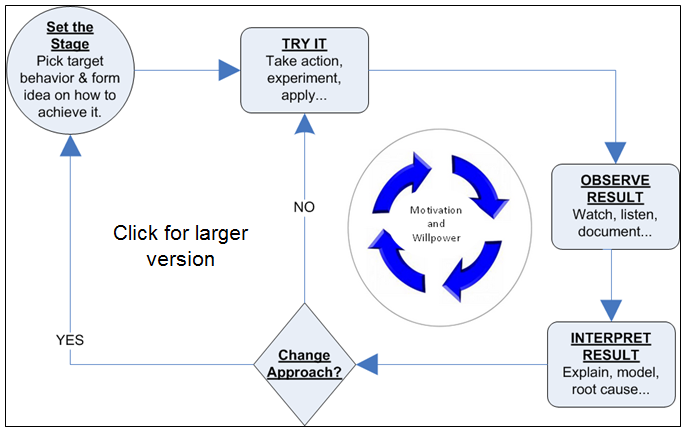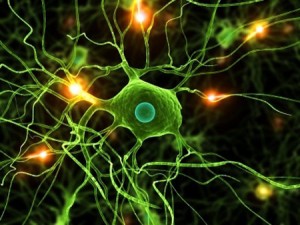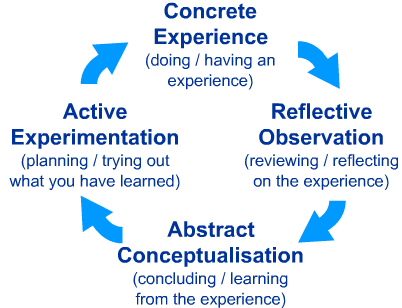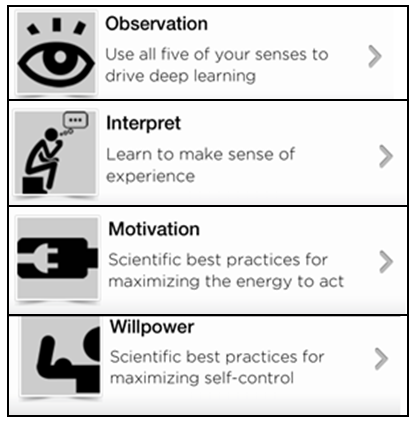Can We Get Better at Learning From Experience?
We learn most things from experience. Learning how to ride a bike, solve algebraic equations, cook a good meal, read a book or get along with a difficult neighbor are just a few examples. The learning from experience process is well understood. It is conceptually simple but error prone in practice.
 We set the stage by deciding what we are trying to learn and selecting a new behavior to try. We try the new behavior, observe the results, interpret the results and decide if we need to change our approach or stay the course. This process is repeated until we reach our goal or give up.
We set the stage by deciding what we are trying to learn and selecting a new behavior to try. We try the new behavior, observe the results, interpret the results and decide if we need to change our approach or stay the course. This process is repeated until we reach our goal or give up.
Of course it takes motivation to get this effort started and willpower to keep it going. Learning something new from experience takes diligence and usually involves some physical, emotional or reputational risks. Remember falling off your bike and the worry of reading poorly out loud as a grade school student?
Given the fundamental role learning from experience plays in acquiring new skills and changing behaviors, getting better at would have a significant impact on our overall cognitive performance. But can we really get better at it?
Fortunately, the answer is yes but we need to approach it one-step at a time. We should focus on improving our observation skills, interpretation skills or our capacity for self-control. Improvement in any one of these areas should translate into faster and deeper learning from experience.
You can use NewHabits, the free iPhone and iPad App to improve your ability to learn from experience. The App includes the following decks of knowledge cards:
Each deck includes 25 proven practices for getting better at one of the steps in learning from experience. You can play a card daily or every few days from your mobile device. Cards are designed to fit into your daily work or home routine and takes just  minutes to play. Each card is one small improvement step but the effects accumulate over time into significant new competencies and habits.
minutes to play. Each card is one small improvement step but the effects accumulate over time into significant new competencies and habits.
Download NewHabits and give some cards a try. Both the motivation and observation decks are free. The other decks are $0.99 or $1.99 but you get 3 sample cards for free.
Categories: Cognitive Development, Problem Solving, Software Tags: experiential learning
Mental Training at the Edge but Not Over
 One reason video games are addictive is that the difficulty of play is automatically adjusted by how well you do. If you are scoring low the game becomes easier by dropping you down a level. Likewise if game play is too easy, the level of difficult increases and you are faced with a greater challenge. By dynamically adjusting the difficultly of play, you are always operating at “the edge of your seat” (or ability) and experience a rich sense of challenge and accomplishment.
One reason video games are addictive is that the difficulty of play is automatically adjusted by how well you do. If you are scoring low the game becomes easier by dropping you down a level. Likewise if game play is too easy, the level of difficult increases and you are faced with a greater challenge. By dynamically adjusting the difficultly of play, you are always operating at “the edge of your seat” (or ability) and experience a rich sense of challenge and accomplishment.
It seems that the same effect can improve brain training at least in older adults. Research reported by the Beckman Institute for Advance Science and Technology found that older adults stay engaged when the intellectual demands of a task optimally match their abilities. Furthermore they found that completing such tasks produced cognitive benefits.
“Stine-Morrow said that engagement in activities that are neither too easy nor too difficult, but push at the boundaries of one’s skill level, produces the highly pleasurable experience known as flow and that the experience of flow may be an important pathway through which older adults can stave off the declines in fluid ability that sometimes accompany aging.”
Intellectually challenging tasks include for example taking a class or reading. The key is to pick the one that keeps you in the optimal balance between challenge and reward. While the research is focused on older adults I suspect the effect works well at all ages.
I am interested to hear from readers that are able to brain train at the edge but not over. How do you adjust the difficulty level?
Source of Image: The Edge
Categories: Cognitive Decline, Lifestyle, Older Adult, Training Tags: experiential learning
Learning Self Control Early Drives Success
 Developing Your Next Brain, or making an effort to improve brain function and reach peak cognitive performance takes a lot of work. One reason we do it is to live a more successful life. While life success has many facets most agree that a cornerstone is self control. Being able to shape our own thinking and emotional responses, manage impulses, avoid self defeating assumptions and persistence in the face of obstacles is critical to living the good life. This has little to do with IQ and a lot to do with your ability to manage yourself.
Developing Your Next Brain, or making an effort to improve brain function and reach peak cognitive performance takes a lot of work. One reason we do it is to live a more successful life. While life success has many facets most agree that a cornerstone is self control. Being able to shape our own thinking and emotional responses, manage impulses, avoid self defeating assumptions and persistence in the face of obstacles is critical to living the good life. This has little to do with IQ and a lot to do with your ability to manage yourself.
There is considerable evidence to support this claim. Take for example, the recent research reported in Science News that suggests:
Good self management skills as early as age three predict health and wealth in adulthood.
The findings are dramatic:
“Low levels of conscientiousness, perseverance and other elements of self-control in youngsters as young as age 3 herald high rates of physical health problems, substance abuse, financial woes, criminal arrests and single parenthood by age 32, says an international team led by psychologists Terrie Moffitt and Avshalom Caspi of Duke University in Durham, N.C.”
How can children develop higher levels of self-control? Research from another group reported in the article claimed behavioral rewards, developing coping skills and role playing simulation using videotape are key. None of this is rocket science. For example, coping skills can include blowing bubbles and making funny faces. The rub is to learn to do these things rather than getting angry or stressed and yelling at others or giving up on a goal.
Very interested to hear from readers that have experience with specific techniques for improving self control and self management skills in children.
Categories: Child, Executive Function, Manage Emotions, Other, Training Tags: EQ, experiential learning
Low Dose Electrical Current Boosts Creativity
 Our thinking and decision-making is strongly shaped by what has worked in the past. Success is compiled into rules and mental sets that make us more efficient but also blind us to innovative alternatives. If we could safely disrupt the applications of mental sets at the right time we might enhance our creativity. That idea was recently tested using transcranial direct current stimulation (tDCS) by researchers at the Center for the Mind.
Our thinking and decision-making is strongly shaped by what has worked in the past. Success is compiled into rules and mental sets that make us more efficient but also blind us to innovative alternatives. If we could safely disrupt the applications of mental sets at the right time we might enhance our creativity. That idea was recently tested using transcranial direct current stimulation (tDCS) by researchers at the Center for the Mind.
The experiment involved 60 subjects that were given a creative problem to solve. Some received a small electrical current applied to their brain in a region thought to hold mental sets that guide our problem solving. The results were dramatic:
“Only 20% of participants solved an insight problem with sham stimulation (control), whereas 3 times as many participants did so…”
A strong effect but one that needs to be repeated and further explained using brain scanning studies.
Only a tiny amount of electrical current is being used in tDCS. It has been the focus of other studies designed to enhance cognitive performance. We covered one from Oxford University in an earlier post on the Next Brain Blog.
I am interested to hear from readers about how low-level direct current is being used to stimulate cognitive performance.
Categories: Other, Problem Solving Tags: cognitive bias, experiential learning, tDCS
Boost Happiness by 25% with Simple Gratitudes
 By consciously cultivating a sense of gratitude you can improve happiness by 25%. While this does not raise your IQ it definitely raises you emotional quotient or EQ by developing skills in recognizing and managing emotions.
By consciously cultivating a sense of gratitude you can improve happiness by 25%. While this does not raise your IQ it definitely raises you emotional quotient or EQ by developing skills in recognizing and managing emotions.
But how do you cultivate gratitude? For some excellent practical tips check out Enhance Happiness and Health by Cultivating Gratitude: Interview with Robert Emmons. Some examples:
“The most common method we use in our research is to ask people to keep a “Gratitude Journal” where you write something you feel grateful for. Doing so 4 times a week, for as little as 3 weeks, is often enough to create a meaningful difference in one’s level of happiness. Another exercise is to write a “Gratitude Letter” to a person who has exerted a positive influence on one’s life but whom we have not properly thanked in the past, and then to meet that person and read the letter to them face to face.”
I am interested to hear from readers that use specific techniques for building EQ through practicing gratitudes.
Categories: IQ and EQ, Lifestyle, Manage Emotions Tags: EQ, experiential learning, smart phone
Neurobics: Low-Effort Cognitive Stimulation!
 Neurobics is a unique approach to brain training developed from the latest findings in neurobiology. According to one popular approach, Keeping Your Brain Alive, the core idea is this:
Neurobics is a unique approach to brain training developed from the latest findings in neurobiology. According to one popular approach, Keeping Your Brain Alive, the core idea is this:
“Neurobic exercises use your five physical senses and your emotional sense in unexpected ways and encourage you to shake up your everyday routines. Neurobics don’t require paper and pen or isolating yourself with puzzles. Everyday life is the Neurobic Brain gym. They can be done anywhere, anytime in offbeat, fun and easy ways while you’re getting up, commuting, working, eating, shopping or relaxing. They are designed to help the brain manufacture its own nutrients that strengthen, preserve and grow brain cells.”
Some examples:
- Take a different route when commuting to work this morning
- Brush your teeth with the other hand
- Use just the sense of touch when unlocking a door (don’t look at the lock)
- Move your waste basket at work
- Sit someone different at the dinner table tonight
Tiny changes with a significant and positive neurochemical impact. Any exercise can be Neurobic as long as it involves your senses in a new context, demands attention and breaks routine. This means we can design our own! The Keep Your Brain Alive Program was developed by Larry Katz a well-known Duke University Neurobiologist and includes 83 very specific things to try.
Interested to hear from readers that do Neurobics. What exercises do you do and how have you built them into your daily routine?
Categories: Books, Cognitive Decline, Lifestyle, Manage Emotions, Mental Focus, Perception Tags: brain training, experiential learning
Learn From Experience – Fast and Deep
How well we learn from experience determines how far we go in our careers and personal relationships. Experiential learning is so basic we take it for granted but it is a complex cognitive process that requires many different skills. Fortunately, we can get better at it, much better at it.
 Learning from experience is a four-step process that repeats. The diagram to the right is based on David Kolb’s theory of experiential learning and illustrates the steps and some of the basic skills involved. What can we learn using this process? Nearly everything it turns out. How to get along with a difficult boss, how to make money on the internet, how to loose weight, how to be happy in retirement and any other worthwhile goal that involves trial and error.
Learning from experience is a four-step process that repeats. The diagram to the right is based on David Kolb’s theory of experiential learning and illustrates the steps and some of the basic skills involved. What can we learn using this process? Nearly everything it turns out. How to get along with a difficult boss, how to make money on the internet, how to loose weight, how to be happy in retirement and any other worthwhile goal that involves trial and error.
The key is try something (concrete experience), observe the effects (reflective observation), draw conclusions (abstract conceptualization), modify your approach (active experimentation) and try again (concrete experience). Often it takes many cycles or attempts to learn something from experience.
Learning from experience is hard to do well. Major challenges include:
- Lack of the skills needed to move through one of the key steps in the process
- Overemphasizing one or two of the key steps
- Giving up too soon or not completing enough cycles for deep learning
- Not moving through the necessary cycles fast enough or cost-effectively
- Not managing it as a process or just “letting it happen”.
Each of these challenges can be met but it takes considerable time and effort. Improving your capacity to learn from experience pays lifelong dividends but like improving critical reasoning or emotional intelligence, requires a considerable investment. Given this, it will be a frequent topic on the Next Brain blog.
A great way to get started is to begin to explicitly manage the process and to learn more about your particular approach to experiential learning.
You can start to manage your experiential learning process by journaling. Focus on a specific goal, something you are already in the process of trying to learn. Keep notes on what you are hypothesizing, testing, trying and observing as you move through the process. The simple act of recording the process in writing and diagrams automatically brings structure and insight. Sometimes just asking the question – What am I actively trying to learn from experience at work and home? – can produce improvements.
 You can use Kolb’s Learning Style Inventory to understand more about your approach, strengths and weakness across the four steps int the process. You answer 13 questions and need to do some simple math and graphing but it is a scientifically validated instrument. It tells you about your style and provides practical advice on how to improve. You can buy a packet of 10 assessments from the Hay Group for $125. A bit pricey but if you are working with a group that is interested in improving learning from experience it is well worth the money. Working in a small group will have many other advantages. I don’t think anyone sells a single copy of the Learning Style Inventory but I did find, Using Kolb’s Learning Style Inventory, at the University of Georgia. This is a 7MG PDF file with a scanned copy of an older version.
You can use Kolb’s Learning Style Inventory to understand more about your approach, strengths and weakness across the four steps int the process. You answer 13 questions and need to do some simple math and graphing but it is a scientifically validated instrument. It tells you about your style and provides practical advice on how to improve. You can buy a packet of 10 assessments from the Hay Group for $125. A bit pricey but if you are working with a group that is interested in improving learning from experience it is well worth the money. Working in a small group will have many other advantages. I don’t think anyone sells a single copy of the Learning Style Inventory but I did find, Using Kolb’s Learning Style Inventory, at the University of Georgia. This is a 7MG PDF file with a scanned copy of an older version.
If you try your hand at journaling, complete the Learning Style Inventory or have other insights into how to get starting in improving experiential learning, please post a comment.
Sources:
Image of learning from experience cycle
Image of Learning Style Inventory
Categories: Memory and Learning Tags: experiential learning, Learning Style Inventory

